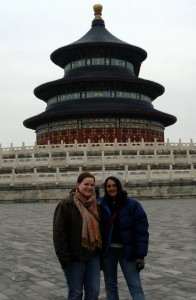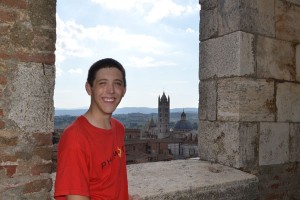A lifelong love of surfing culminating in a semester riding Southern Ocean waves; A native Londoner living with a Chinese family, having never spoken the language; A firsthand experience teaching English in Austria while learning the area’s history; A glance of recognition from a local walking down a colorful street in an Italian town.
These are just a few experiences had by Ithaca College students who are studying abroad this semester. For four juniors, personalizing their experiences meant more than visiting rare locations or working at stellar internships — the cultural immersion they are experiencing is what’s stood out so far.
Beijing, China

A native Londoner, junior Rachel Thompson wanted to venture away from European culture. She chose China because she was unfamiliar with the language, the politics and the everyday life.
“I don’t know anything about the culture, except for Chinese food and Kung Fu,” she said.
Through classes in Mandarin, she is slowly picking up the language. She lives in a homestay, and interactions with her family educate her about Chinese culture. Even her meals are authentic.
She recently finished a Tibetan studies class, which included a trip to some more rural regions of Tibet, where, after several days of not showering, she ended up bathing in a local river.
But even the showering experience in her homestay sparked some culture shock.
“There’s literally a showerhead in the bathroom but no bathtub, so you just shower in the middle of the bathroom and then wait for it to dry,” she said.
Sydney, Australia

From surfing the ocean to working for a television station that captures classic Australian culture, junior Jeff Reagan is riding the waves down under.
In addition to classes at the University of New South Wales, Reagan works as an intern for National Indigenous Television.
The channel is the only local one dedicated to the portrayal of the indigenous people’s culture.
“I would sum it up as if Time Magazine had it’s own channel, but it focused all on indigenous people,” he said.
Reagan said though he didn’t have to learn another language, there were some barriers with the Aussie dialect.
“They have a lot of different lingo,” he said. “Such as, ‘cheers’ instead of ‘goodbye.’”
Though they are from opposite ends of the world, Reagan and his Australian comrades have a common passion — surfing.
“Surfing in Australia definitely defines the moment for me,” he said. “This is probably the best surf I’ve had.”
Siena, Italy
Unlike many students who study abroad and choose to go to a major city, junior Matt Prokosch had other ideas. Instead, he is currently living in the tiny town of Siena in the middle of Tuscany.
“I feel more comfortable in small cities,” he said.
Siena is so small that Prokosch has come to recognize the locals, something he said he never expected while studying abroad. Living in Siena has allowed Prokosch to practice his Italian.

“When I can actually effectually communicate in Italian to a native, it’s one of the best feelings ever,” he said.
Prokosch said even though the locals’ perception of tourists isn’t always positive, his host family has made him feel at home.
“When you actually go to someone’s house or you actually know them personally, they’re just like the nicest, warmest people I’ve ever met,” he said. “That’s where the Italians and maybe most Europeans in general really shine.”
Vienna, Austria
Though she is a physical therapy major, junior Meaghan O’Donnell has always had a passion for history. She chose Vienna because she wanted to be immersed in a rich culture, where she has been able to pursue her strong interest in WWII history.

She has spent some of her free time traveling to Kraków, one of the five major Jewish ghettos during the Holocaust, and Auschwitz, a concentration camp.
O’Donnell is working at an internship in Vienna, where she has experienced the immense cultural differences and shared some of her own culture with younger Austrians. She teaches English to seventh to 12th graders twice a week.
The atmosphere is much more relaxed and teachers travel from room to room, rather than the students, O’Donnell said.
“They don’t really have any consequences or discipline, and there are foosball tables in the hallway,” she said. “But they still have to learn to pass exams that are much more difficult than in the U.S.”
Before you go…
Pack a small first-aid kit.
Make copies of important documents, like passports.
Learn about cultural differences and attitudes.
Stay connected — inquire about Internet access and cellphones.
Set up means to pay monthly bills, file income taxes or vote.
Purchase electrical adaptors, if needed.
Check health insurance coverage.
Learn about local transportation.




